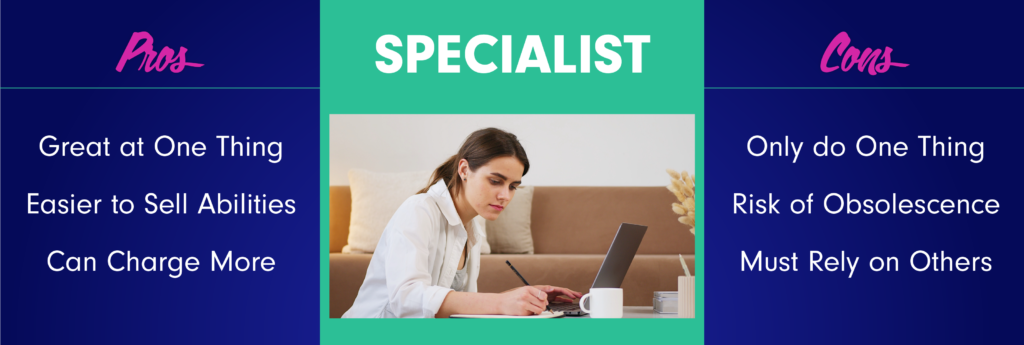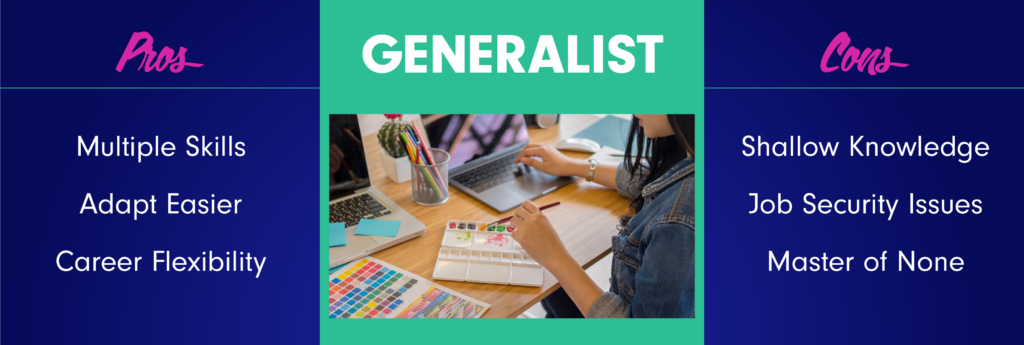It’s the age-old question: is it better to be a specialist or a generalist? Are you better off by being great at one thing, or good at many things? I recently had the honor of speaking to a management class at Keene State College where I got to give my version of the answer to this question.
For both options, there are pros and cons.

Specialists are great at one thing. But it’s the only thing they’re good at. It can be easier to sell those services (or get hired at a job) if you have one skill where you excel. But this puts your career at risk if that one skill is no longer necessary. I spent a lot of time learning Macromedia/Adobe Flash in the early/mid-2000s. I would have been in trouble if I had put all my time and energy into mastering that one application.
Specialists have the opportunity to charge more for their services because they are great at that particular skill. They’ve put in the work to be one of the best. But many skills require collaboration with others. In those instances, the specialist must rely on others to complete the project. For those who want full responsibility, this can be challenging.

On the other hand, Generalists have many skills, but the knowledge isn’t very deep across those skill areas. Because generalists have many skills, it can help them be more adaptable when new situations arise. They can provide help because they can quickly evaluate multiple options for solving a problem. Generalists are able to see where multiple things can converge.
People who are just starting out in their careers struggle to be generalists. It takes time to learn a variety of skills to be a generalist. This is also why you see that leaders tend to be generalists.
When you’re first starting out, you’ll most likely focus on one thing. You’ll be aware of many adjacent skills, but your focus will be one area.

As time goes on, as you continue to master your primary skill, you’ll pick up some adjacent skills. This is when you start to go from a T-shaped skillset to a V-shaped skillset.

These are now all your skills within your toolbox. It’s a lot, but it’s a nice portfolio of skills. It provides you with a lot of career flexibility.

And with all these skills usually comes additional responsibility. If all these areas are your responsibility, you’re probably in a lot of pain at this point. It’s too much for one person to handle. Hopefully, your company sees this pain and wants to help alleviate it. The company will then start hiring people to help offset some of the workload. And who better to lead these new people but the person who best knows what needs to be done: you!

This is when you, as a generalist, can move up into a leadership position. These are still the areas you’re responsible for, but now you have people who can help with the day-to-day work.
As your responsibilities move from specialist to generalist, you need to hire more specialists.

Now, this doesn’t mean that everyone must become a manager to further their career. We’ve all seen instances of a specialist who was great at their job but ended up a less-than-great manager. I’m fortunate to work for a company that has an individual contributor career track as well as a management career track.
Company size plays a role in the type of position that would be available. Smaller companies have fewer people, so they often need generalists to wear multiple hats and do different jobs. Larger companies can have more people dedicated to specialty work.
Not all specialists become generalists. There are many people who are great at their one job and that makes them happy. But for those who are looking to broaden their experience and skills, becoming a generalist is a great way to achieve that.
The question of which is better, being a specialist or being a generalist, all comes down to what you want to do. Some people can’t imagine the chaos of switching gears every 20 minutes to do something different. Other people would suffer doing the same thing every day, all day long.
Personally, I enjoy changing up what I do. It gives me options so I can do different things and exercise different skill muscles throughout the day. When I started out, I did the same thing all day long. But as I gained experience, I wanted to learn try new things and see where I could grow/expand/increase my skills.


